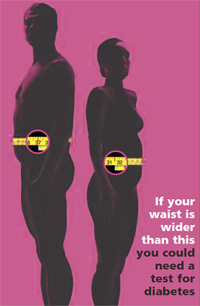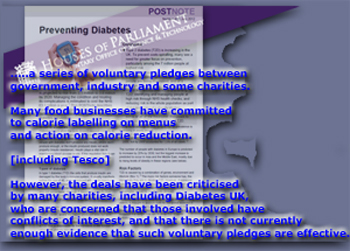 |
 |
|
Diabetes Week is a highlight in the Diabetes UK calendar. It’s a time when the organisation calls on support from everywhere to raise awareness of the condition, and raise funds for the charity's work. Diabetes Week 2015 began yesterday and continues until this coming Saturday (20th June) and the CWU Health, Safety & Environment Department is supporting This Diabetes Week Diabetes UK wants to remind everyone that you’re not on your own when it comes to Diabetes. Actually there’s a lot of people out there going through the same thing. And Diabetes UK is working for those people. And they have lots of ways they can help. Throughout the week, Diabetes UK will be talking about all of the ways they give support, advice, and chances to learn more about diabetes to help people be aware of the signs, symptoms and how to manage the condition well. And Diabetes UK would like to hear feedback, hints, tips and stories of living life to the full. Measure Up – are you at risk of Diabetes? Over two million people in the UK have Diabetes. Another 750,000 have diabetes but are completely unaware of it. Attached is information and leaflets to find out more. Diabetes is serious. If left untreated it can lead to blindness, kidney failure, heart disease and other life-threatening complications. Many people with diabetes have had it for between nine and 12 years before it is diagnosed. By this time many of these people will have started to develop some of the complications. But the good news is that if people can spot their diabetes early they can greatly reduce the risk of serious health problems. So those who suspect they have symptoms should go to their GP and get a test. Type 1 v Type 2 Diabetes There are two main types of diabetes. Type 1 diabetes usually affects people under 40 and is treated with insulin injections, diet and regular physical activity. Type 2 diabetes is usually found in white people over 40 years old and in black and Asian people and people from minority ethnic groups aged over 25 years. It can be treated with diet and physical activity alone – although most people will also need tablets and sometimes insulin injections. Over three quarters of people with diabetes have Type 2. Those at risk!
The more risk factors that apply - the greater the individual's risk of having diabetes. The Symptoms The symptoms of untreated diabetes will usually be very obvious in people with Type 1 diabetes but not so clear or non-existent in people with Type 2 diabetes. If you’re older you may put the symptoms down to ‘getting on a bit’. • increased thirst The Complications Diabetes is serious because it can lead to life-threatening complications. These include: • blindness The risk of developing complications can be greatly reduced by getting diagnosed early and then controlling the diabetes. People can lead a full and healthy life with diabetes but the key is getting diagnosed as early as possible. For Information and Resources on Diabetes Week please contact Diabetes UK at:- diabetesweek@diabetes.org.uk
The Diabetes UK Careline is on 0845 120 2960 or email careline@diabetes.org.uk for confidential support and information. About Diabetes UK Diabetes UK is the leading charity in the UK for people with diabetes, their family, friends and carers. Their mission is to improve the lives of people with the condition and to work towards a future without diabetes. They are a membership organisation – to join ring 0800 138 5605 or visit www.diabetes.org.uk/join Source: CWU LTB384/15 Dave’s orginal LTB contains various documents which are available from this website’s E-Library Database. Use the key word, ‘diabetes’ and select the document you wish to download. You can also download the original LTB384/15 in full here
|
 Dave Joyce, CWU’s National Health, Safety & Environment Officer discusses this year’s Diabetes Week:
Dave Joyce, CWU’s National Health, Safety & Environment Officer discusses this year’s Diabetes Week: People who are white and over 40 years old, or black, Asian or from a minority ethnic group and over 25 years old and have one or more of the following risk factors, should ask their GP for a test for diabetes:
People who are white and over 40 years old, or black, Asian or from a minority ethnic group and over 25 years old and have one or more of the following risk factors, should ask their GP for a test for diabetes: